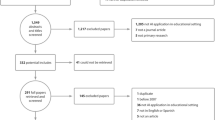Abstract
In this commentary, I will critically elaborate on the potential impact of the coordinated papers of this volume on further development of research in mathematics education. The papers, which share common theoretical frameworks, will be categorized into three different classes: ‘demolishers of illusions’, ‘economizers of thought’ and ‘energizers of practice’. I will analyze the role played by psychology and related sciences as a possible enrichment of the frameworks, especially where technologies are concerned. Finally, I will discuss the possible conflict between the need to consider the phenomena elicited in this kind of studies and the sophistication required by the theoretical constructs, which makes the results of these studies very difficult to communicate to the international community.
Similar content being viewed by others
References
Artigue, M.: 2002, ‘Ingégnierie didactique: quel rôle dans la recherche didactique aujourd’hui?’, Revue Internationale des Sciences de l’Education 8, 59–72.
Arzarello, F.: in press, ‘Mathematical landscapes and their inhabitants: Perceptions, languages, theories’, in Proceedings of ICME 10, Plenary Lecture.
Arzarello, F. and Bartolini Bussi, M.G.: 1998, ‘Italian trends in research in mathematical education: A national case study from an international perspective’, in A. Sierpinska and J. Kilpatrick (eds.), Mathematics Education as a Research Domain: A Search for Identity, Kluwer Academic Publishers, Dordrecht, pp. 243–262.
Bartolini Bussi, M.G.: 1996, ‘Mathematical discussion and perspective drawing in primary school’, Educational Studies in Mathematics 31, 11–41.
Bartolini Bussi, M.G.: 1998, ‘Verbal interaction in the mathematics classroom: A Vygotskian analysis’, in H. Steinbring, M.G. Bartolini Bussi and A. Sierpinska (eds.), Language and Communication in the Mathematics Classroom, NCTM, Reston, VA, pp. 65–84.
Bartolini Bussi, M.G., Boni, M., Ferri, F. and Garuti, R.: 1999, ‘Early approach to theoretical thinking: Gears in primary school’, Educational Studies in Mathematics 39, 67–87.
Boero, P.: 1994, ‘Situations didactiques et problèmes d’apprentissage: Convergences et divergences dans les perspectives de recherche’, in M. Artigue, R. Gras, C. Laborde, and P. Tavignot (eds.), Vingt ans de didactique des mathématiques en France: Hommage àGuy Brousseau et Gérard Vergnaud), La Pensée Sauvage, Editions, pp. 17–50.
Brousseau, G.: 1997, Theory of Didactical Situations in Mathematics. Didactique des Mathématiques, 1970–1990, Kluwer Academic Publishers, Dordrecht.
Chevallard, Y.: 1991, La trasposition didactique du savoir savant au savoir enseigné, La Pensée Sauvage, Editions, Grenoble.
Cobb, P. and Bauersfeld, H. (eds.): 1995, The Emergence of Mathematical Meaning: Interaction in Classroom Cultures, Lawrence Erlbaum Associates, Inc., Mahwah, NJ.
Kilpatrick, J.: 1994, ‘Vingt ans de didactique française depuis les USA’, in M. Artigue, R. Gras, C. Laborde, and P. Tavignot (eds.), Vingt ans de didactique des mathématiques en France: Hommage àGuy Brousseau et Gérard Vergnaud), La Pensée Sauvage, Editions, Grenoble, pp. 84–96.
Laborde, C.: 2000, ‘Dynamic geometry environments as a source of rich learning contexts for the complex activity of proving’, Educational Studies in Mathematics 44, 151–161.
Lagrange, J.: 2002a, ‘Les outils informatiques entre “sciences mathématiques“ et enseignement. Une difficile trasposition?’, in D. Guin and L. Trouche (eds.), Calculatrices Symboliques.Tranformer un outil en un instrument du travail mathématique: un problème didactique, La Pensée Sauvage, Editions, Grenoble, pp. 89–116.
Lagrange, J.: 2002b, ‘Etudier les mathématiques avec les calculatrices symboliques. Quelle place pour les techniques?’, in D. Guin and L. Trouche (eds.), Calculatrices Symboliques. Tranformer un outil en un instrument du travail mathématique: un problème didactique, La Pensée Sauvage, Editions, Grenoble, pp. 151–186.
Lakoff, G. and Nu nez, R.: 2000, Where Mathematics Comes From: How the Embodied Mind Brings Mathematics into Being, Basic Books, New York.
Lampert, M.: 2001, Teaching Problems and the Problems of Teaching, Yale University Press, New Haven and London.
Leont’ev, A.N.: 1978, Activity, Consciousness and Personality, Prentice Hall, Englewood Cliffs, NJ.
Leont’ev, A.N.: 1981, Problems in the Development of Mind, Progress, Moscow.
Mariotti, M.A.: 2000, ‘Introduction to proof: The mediation of a dynamic software environment’, Educational Studies in Mathematics 44, 25–53.
Maschietto, M.: 2002, L’enseignement de l’analyse au lycee: les debuts du jeu global/local dans l’environnement de calculatrices, Doctoral Dissertation, Université Paris 7 and Università di Torino, IREM Paris 7.
Pedemonte, B.: 2002, Etude didactique et cognitive des rapports de l’argumentation et de la démonstration dans l’apprentissage des mathématiques, Doctoral Dissertation, Université Joseph Fourier, Grenoble I, Università di Genova.
Rabardel, P.: 1995, Les hommes and les technologies. Approche cognitive des instruments contemporains, Armand Colin, Paris.
Seeger, F.: 2001, ‘A large territory: One year in an elementary mathematics classroom’, Mind, Culture and Activity: An International Journal 10, 168–172.
Seeger, F., Voigt, J. and Waschescio, U. (eds.): 1998, The Culture of the Mathematics Classroom, Cambridge University Press, Cambridge.
Sierpinska, A. and Kilpatrick, J. (eds.): 1998, Mathematics Education as a Research Domain: A Search for Identity, Kluwer Academic Publishers, Dordrecht.
Sierpinska, A.: 2000, The ‘Theory of Didactic Situations’: Lecture Notes for a Graduate Course with Samples of Students’ Work, Master in the Teaching of Mathematics, Concordia University (see also TDS Lecture 8 accessible from http://alcor.concordia.ca/~sierp/).
Stein, M.C., Smith, M.S., Henningsen, M.A. and Silver, E.A.: 2000, Implementing Standards-Based Mathematical Instruction: A Casebook for Professional Development, Teachers College Press, New York.
Toulmin, S.E.: 1958, The Use of Arguments, Cambridge University Press, Cambridge.
Trouche, L.: 2002a, ‘Les calculatrices dans l’enseignement des mathématiques: une évolution rapide des matériels, des effets différenciées’, in D. Guin and L. Trouche (eds.), Calculatrices Symboliques. Tranformer un outil en un instrument du travail mathématique: un problème didactique, La Pensée Sauvage Editions, Grenoble, pp. 21–54.
Trouche, L.: 2002b, ‘Une approche instrumentale de l’apprentissage des mathématiques dans des environments de calculatrice symbolique’, in D. Guin and L. Trouche (eds.), Calculatrices Symboliques. Tranformer un outil en un instrument du travail mathématique: un problème didactique, La Pensée Sauvage Editions, Grenoble, pp. 21–54.
Vergnaud, G.: 1990, ‘La théorie des champs conceptuels’, Recherches en Didactique des Mathématiques 10(2–3), 133–170.
Author information
Authors and Affiliations
Corresponding author
Rights and permissions
About this article
Cite this article
Bussi, M.G.B. When Classroom Situation is the Unit of Analysis: The Potential Impact on Research in Mathematics Education. Educ Stud Math 59, 299–311 (2005). https://doi.org/10.1007/s10649-005-5478-1
Issue Date:
DOI: https://doi.org/10.1007/s10649-005-5478-1



